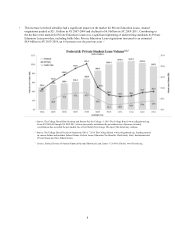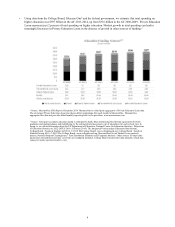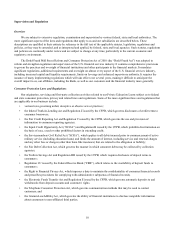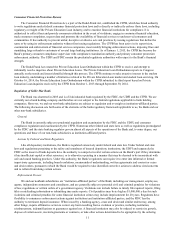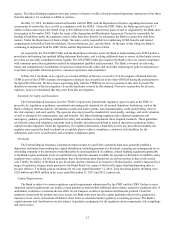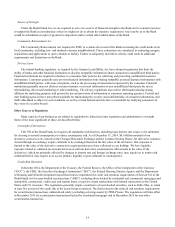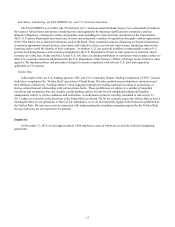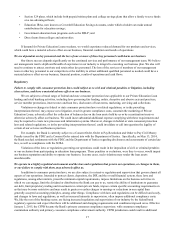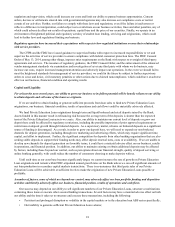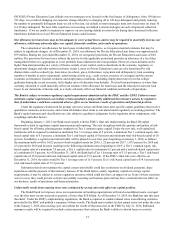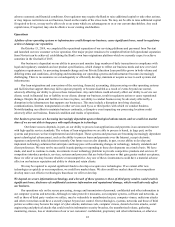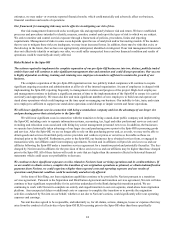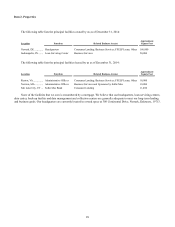Sallie Mae 2014 Annual Report Download - page 20
Download and view the complete annual report
Please find page 20 of the 2014 Sallie Mae annual report below. You can navigate through the pages in the report by either clicking on the pages listed below, or by using the keyword search tool below to find specific information within the annual report.regulation and supervision, which could increase our costs and limit our ability to pursue business opportunities. Consent
orders, decrees or settlements entered into with governmental agencies may also increase our compliance costs or restrict
certain of our activities. Further, our failure to comply with these laws and regulations, even if the failure is inadvertent or
reflects a difference in interpretation, could subject us to restrictions on our business activities, fines and other penalties, any of
which could adversely affect our results of operations, capital base and the price of our securities. Finally, we operate in an
environment of heightened political and regulatory scrutiny of student loan lending, servicing and originations, which could
lead to further laws and regulations limiting our business.
Regulatory agencies have increased their expectations with respect to how regulated institutions oversee their relationships
with service providers.
The CFPB and the FDIC have issued guidance to supervised banks with respect to increased responsibilities to vet and
supervise the activities of service providers to ensure compliance with federal consumer protection laws. The FDIC Consent
Order of May 13, 2014, among other things, imposes strict requirements on the Bank with respect to oversight of third-party
agreements and services. The issuance of regulatory guidance, the FDIC Consent Order, and the enforcement of the enhanced
vendor management standards via examination and investigation of us or any third party with whom we do business, may
increase our costs, require increased management attention and adversely impact our operations. In the event we should fail to
meet the heightened standards for management of service providers, we could in the future be subject to further supervisory
orders to cease and desist, civil monetary penalties or other actions due to claimed noncompliance, which could have an adverse
effect on our business, financial condition and operating results.
Capital and Liquidity
For at least the next several years, our ability to grow our business to its fullest potential will be heavily reliant on our ability
to obtain deposits and sell some of the loans we originate.
If we are unable to obtain funding or generate sufficient proceeds from loan sales to fund new Private Education Loan
originations, our business, financial condition, results of operations and cash flows could be materially adversely affected.
We fund Private Education Loan originations through term and liquid brokered and retail deposits raised by the Bank.
Assets funded in this manner result in refinancing risk because the average term of the deposits is shorter than the expected
term of the Private Education Loan assets we create. Also, our ability to maintain our current level of deposits or grow our
deposit base could be affected by regulatory restrictions, including the possible imposition of prior approval requirements or
restrictions on deposit growth through brokered deposits. As a supervisory matter, reliance on brokered deposits as a significant
source of funding is discouraged. As a result, in order to grow our deposit base, we will need to expand our non-brokered
channels for deposit generation, including through new marketing and advertising efforts, which may require significant time,
capital, and effort to implement. Further, the significant competition for deposits from other banking organizations that are also
seeking stable deposits to support their funding needs may affect deposit renewal rates, costs or availability. If we are unable to
develop new channels for deposit generation on favorable terms, it could have a material adverse effect on our business, results
in operations, and financial position. In addition, our ability to maintain existing or obtain additional deposits may be affected
by factors, including those beyond our control, such as perceptions about our financial strength, quality of deposit servicing or
online banking generally, with could reduce the number of consumers choosing to make deposits with us.
Until such time as our asset base becomes significantly larger, we cannot increase the rate of growth on Private Education
Loan originations and remain within FDIC-stipulated annual growth rates on the Bank unless we can sell significant amounts of
our loan production in secondary capital markets transactions. There is no assurance that third party sales of our Private
Education Loans will be achievable at sufficient levels to make the origination of new Private Education Loans possible or
profitable.
A number of factors, some of which are beyond our control, may adversely affect our loan portfolio funding and disposition
activities and thereby adversely affect our business, financial position, results of operations and cash flows.
Our success may depend on our ability to sell significant numbers of our Private Education Loans, structure securitizations
containing those loans or execute other secured funding transactions. Several factors may have a material adverse effect on both
our ability and the time it takes us to structure and execute these transactions, including the following:
• Persistent and prolonged disruption or volatility in the capital markets or in the education loan ABS sector specifically;
• Our inability to generate sufficient Private Education Loan volume;
18


